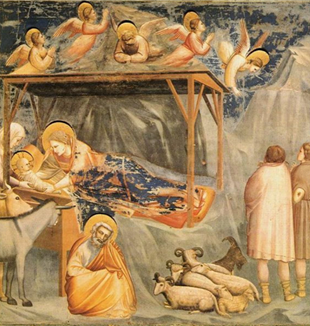
He Dwells Among Us
An invitation to read January’s Book of the Month, Jesus of Nazareth: The Infancy Narratives by Pope Benedict XVI.The Church always has us enter the new year under the protection of Mary, Mother of God, and the Holy Family. This past Sunday, the feast of the Holy Family, our priest’s homily focused on highlighting the realism of the Christmas story and the hardships that the Holy Family had to face from the very first moment that Joseph accepted Mary and the baby that was not his, to their refugee years in a foreign land, fleeing for their lives. The holiness of the Holy Family, he said, is not in spite of these trials and setbacks, but through and within them. Being recalled to this fact always resonates with me, because every Christmas I know someone if not myself carrying heavy burdens of suffering and pain. To be reminded that the God of the universe chose to enter the world in littleness, suffering, and oblivion, never ceases to renew my hope.
Reading The Infancy Narratives this time, I have been most struck by the surprising way Pope Benedict begins the book, with the question of Pilate: “where do you come from?” As unusual as it seems for a starting point on Christ’s infancy, this question gives form to the wonder and mystery that remains perennially at the foundation of the Christmas story: who are you, who condescends to be born from a woman’s womb, in the frailty and need of helpless flesh, dependent for your very existence on the care of a broken world? The gospels, Benedict tells us, “set out to answer [this] question”, to show us Who Jesus is, and where he comes from, within the context of the history of the Jewish people, and the ancient promises.
Bl. Elizabeth of the Trinity has an amazing line that strikes me to the bone: “God has plans that we do not always understand, but that we must adore.” In his reflection on the annunciation, Benedict reflects on Mary’s position after the angel left her: “the great hour of Mary’s encounter with God’s messenger – in which her whole life is changed – comes to an end, and she remains there alone, with the task that truly surpasses all human capacity. There are no angels standing around her. She must continue along the path that leads through many dark moments.” Mary remains faithful to the Word of God, even without understanding. I think also of the shepherds, whom we place around our creches every year, without really thinking about the Gospel story concerning them. These shepherds, after receiving a glorious vision of angels and the pronouncement that the Savior had come, were told to go find him in a manger. I wonder if they all went. I wonder if some of them decided not to go. In a manger? What kind of Messiah comes in a manger? And they begin to doubt and question the supernatural vision they have just had. But others, in the initial act of faith and trust in the grace they just received, go anyway. And what do they find? In a cold, dark, damp, smelly hole in the rock, a man and woman, and a red, wriggling tiny bundle of flesh tucked in the smelly grassy hay of the animals’ feeding trough, surrounded by dung and dirt and straw and the breath of beasts. And this was the Messiah? In the face of such a circumstance that they could not understand, the shepherds nevertheless leave “glorifying God” and telling everyone in the city about him. In the face of the plan of God that they did not understand, they responded with adoration: they knelt in that dirt and that straw in front of a helpless, tiny infant, and they adored in awe and reverence the Mystery of God’s plan unfolding in front of them. Because in that first moment, the one thing they did understand was the one thing they needed to: the God of Israel is faithful in all things, and He is Almighty.
The story of Christmas always reminds me that the plan of God – the will of God for us – is revealed in our circumstances in spite of our understanding. He comes to us there, in the last places we expect Him to be, and it is there that we can recognize and adore Him. And it is precisely in the circumstances that we do not understand that it seems God has more room to show Himself to us: because we have to look harder. We have to ask the question, “Lord, where are You?” In the face of difficult, painful things, we wake up.
Pope Benedict points our attention to the astounding paradoxes of the Christmas story with his capacity to highlight the wonder of the God Who shows Himself in the most unlikely places, and yet in so doing, fulfills over-abundantly all of our expectations. Reflecting on the readings for the feast of the Holy Family, I found my heart challenged to look for that wriggling Infant in the dirtiest, darkest places in my heart and in my loved ones’ lives. I felt invited to adore Him there, even when I cannot see Him, out of the unshakable belief that He is hidden precisely in those places.
This first month of the year, I invite you to continue or to begin to journey with Pope Benedict, immersing yourself more deeply in the mystery of our God made flesh, who still dwells among us.
Siobhan, Fairfax, VA